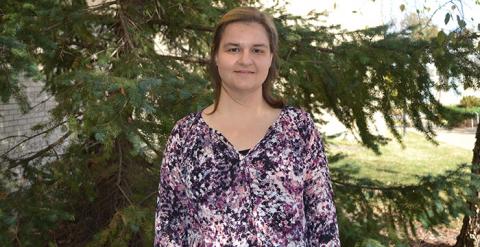Durbak recognized for teaching excellence
Assistant Teaching Professor Amanda Durbak was awarded the 2018 Provost’s Outstanding Junior Faculty Teaching Award.
The award, which comes with a $1000 prize, recognizes exceptional teaching to the university by an early career faculty member.
According to Durbak, her first concern when approaching any teaching situation is to engage the students. That’s why she uses “pool noodles” to teach meiosis, has ping pong balls to teach photosynthesis, has choreographed a phospholipid dance, shares news stories that relate to a science concept in class, and uses clickers to play a quiz-style game based on Jeopardy to have students practice for exams. If you want students to have a lasting memory of a concept and to apply that knowledge later on, she said, you have to give them a reason to genuinely be interested in the subject at hand. For Durbak, these student-centered, active learning techniques are what make her an effective teacher. Her students clearly agree.
S. Blake Greufe took cell biology, a high enrollment course for biological sciences majors, with Durbak.
“Dr. Durbak prepares students for the future,” Greufe said. “Many students who take Cell Biology plan to go on to a career in a health-related field. Knowing this, Dr. Durbak frequently used questions from the MCAT, DAT, and other entrance exams in her class to help us work on critical thinking skills and to develop a higher level of understanding of each topic. This teaching strategy has personally served me well, because I am one of those students.”
Alison Condra, who took introductory to biological sciences with Durbak her first semester at MU, said what impressed her most was Durbak’s effort to engage students personally, even in a large enrollment class.
“Going into college, I was worried about the lecture halls feeling overwhelmingly large. Dr. Durbak, however, put me at ease right away and showed that size doesn’t have to matter,” wrote Condra. “I feel blessed to have had Dr. Durbak during my first semester of college. She showed me that the teachers at Mizzou really care for their students.”
It’s not just students who recognize Durbak’s talent for engaging students in their own learning. Bethany Stone is a teaching professor in biological sciences who is the recipient of many teaching honors. Engaging 300+ students with varied backgrounds and interests in science is a challenging task that, Stone said, Durbak has embraced in a “scholarly” way.
“Dr. Durbak has spent a large amount of time finding vetted educational resources and learning about evidence-based teaching practices. She is thoughtful in her approaches and gathers information about an approach before using it in class,” Stone said. “She works to learn as well as teach.”
Two years ago, Durbak approached Professor Jim Schoelz with the Division of Plant Sciences about helping to co-teach a graduate-level course on plant stress biology. Durbak, who was trained as a developmental plant biologist, wanted to stay current with plant research and also interact regularly with graduate students. Like Stone, Schoelz said Durbak’s engagement in her own learning is what makes her an outstanding teacher.
“I am truly impressed with her love of learning and with her desire to share her insights with the students in the class,” Schoelz said. “She has all the hallmarks of an outstanding teacher: a deep knowledge base, an interest in her own continued learning, and is very approachable and empathetic towards students.”
“I’ve always been very grateful to be a part of the Division of Biological Sciences and to get to work with such wonderful and talented colleagues and students,” said Durbak. “Knowing that my colleagues and students appreciate my teaching contributions to the Mizzou community makes it that much more rewarding.”
Durbak’s teaching has been recognized at a national level with an invitation to attend the prestigious Howard Hughes Medical Institute’s Summer Institute on Scientific Training for Undergraduate STEM Education in 2016.
